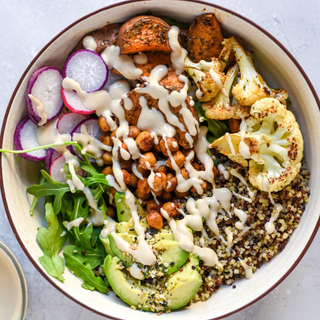
Thinking about having meat-free days? Whether it’s a meatless Monday or a meat-free meal, there are many benefits of decreasing your meat consumption. Like helping the environment but that’s a topic for another day, today we’re tackling the health benefits of meatless meals.
On average Australians are overconsuming meat (1), high meat consumption has been linked to an array of health issues including cardiovascular diseases, colon cancer and diabetes (2). So, that’s already three good reasons to decrease, right? But we’re not here to be negative about food groups, let's choose to have meatless meals based on the positives.
Many cultures have been practising vegetarianism or a flexitarian diet, way before we put labels on it. In fact, people have been practising vegetarian diets since the mid-19thth century.
Like in Okinawa, Japan known as “the land of immortals” as citizens have one of the highest life expectancies in the world. What is their secret? A diet composed of unrefined complex carbohydrates, fibre-rich fruits and vegetables, and soy (3). The Mediterranean diet also follows a similar approach with minimal meat and a focus on legumes and seafood as a protein source.
So, what defines a vegetarian meal?
Vegetarians don’t consume animal foods; however, some people follow different variations associated with animal by-products which – naturally – we've created more labels for like lacto-vegetarian, vegan, and pescatarian... the list goes on (4).
The Australian Dietary Guidelines recommend enjoying a wide variety of nutritious foods from the five food groups (i.e., fruit, vegetables, grains, meat and legumes, dairy products, and plenty of water) (5). The guideline displays what foods we should be eating regularly to meet nutritional requirements and promote health and wellness.
The vegetarian diet follows aspects of the guidelines with an emphasis on a combination of plant proteins, unlike meat, plant proteins aren’t whole. Meaning they don’t contain all 9 essential amino acids that our bodies need to build protein. Each plant protein contains different amino acids, so combining them in a meal helps achieves all 9 like having rice with corn. But there is one superstar plant protein that has all 9, and that’s soy which is why tofu is a great meat substitute in your meatless meals.
5 reasons you should include meatless meals or days:
Meatless meals are;
1. High in vitamins and minerals
Vegetarian meals usually have more vegetables to make up for the meat component of a dish like an eggplant parma or mushroom steak. Vegetables are rich in vitamins, minerals, and natural compounds such as phytochemicals that boost immunity and reduce the risk of diet-chronic diseases (6). The tip, “eating a rainbow” of vegetables (not artificially coloured lollies) is a great way to get a variety of nutrients in the body.
Next time you make a vegetarian meal fill your plate with;
- yellow and orange vegetables (i.e., carrots, pumpkin, and corn) which are rich in vitamin A and potassium (7)
- blue and purple vegetables (i.e., eggplant, purple cabbage) are rich in vitamin C, manganese, and B vitamins (7)
- red vegetables (i.e., red capsicum, tomatoes, beetroot) which are rich in lycopene (7)
- green vegetables (i.e., kale, spinach) are rich in iron, calcium, and vitamin K (7)
2. Low in saturated fat and free from cholesterol
Unlike meat, plant-based foods are naturally low in saturated fat and free from cholesterol (8). A common dairy and meat alternative, soy products like tofu, is associated with reduced total cholesterol and LDL cholesterol levels, as markers for coronary heart disease risk (5).
3. Good source of fibre
Vegetarian meals usually contain a variety of plant-based proteins, like beans, rice, legumes and an array of vegetables all of which are a great source of fibre. This helps us feel fuller for longer and promotes healthy digestion and therefore may improve gut health.
4. Reduced risk of diet-related diseases
Converting to a plant-based diet, including legumes, may lower the possible risk of developing type 2 diabetes, and may improve the blood sugar and lipid control for those who already have diabetes (9). Consuming legumes is also linked with a reduced risk of colorectal cancer (5).
5. Increase in variety of foods.
Eating a diverse range of food groups is extermely important in maintaining a healthy balanced lifestyle - vegetarian or not - as they provide different types and amounts of key nutrients. Including meatless meals will most likely result in you trying more food groups to ensure your creating a balanced meal.
Overall, vegetarian meals promote a balanced and fibre-rich diet that consists of whole foods like whole grains, legumes, fruits, nuts, and a variety of vegetables, which helps promote health and well-being.
We’ve made your meatless days easy with our vegetarian menu!
References
1. Tim W, Nathan P. Meat Consumption - Analysis of global meat consumption trends. ABARES Agricultural Commodities: March 2019 99
2. Evelyne R, Beatrice B, Beatrice C, Roger D, Alexandra S, and Ulrich K. Health Risks Associated with Meat Consumption: A Review of Epidemiological Studies. Int. J. Vitam. Nutr. Res., 85 (1 – 2), 2015, 70 – 78
3. Gabriel A, Ninomiya K, Uneyama H. The Role of the Japanese Traditional Diet in Healthy and Sustainable Dietary Patterns around the World. Nutrients [Internet]. 2018; 10(2). Available from: https://www.ncbi.nlm.nih.gov/pmc/articles/PMC5852749/
5. Council NH and MR. Australian Dietary Guidelines - providing the scientific evidence for healthier Australian diets (2013). Available from: https://www.eatforhealth.gov.au/file/australian-dietary-guidelines-providing-scientific-evidence-healthier-australian-diets-2013
6. Mitra S, Paul S, Roy S, Sutradhar H, Bin Emran T, Nainu F, et al. Exploring the Immune-Boosting Functions of Vitamins and Minerals as Nutritional Food Bioactive Compounds: A Comprehensive Review. Molecules [Internet]. 2022; 27(2). Available from: https://www.ncbi.nlm.nih.gov/pmc/articles/PMC8779769/
7. Slavin J, Lloyd B. Health Benefits of Fruits and Vegetables. Advances in Nutrition [Internet]. 2012;3(4):506-516. Available from: https://www.ncbi.nlm.nih.gov/pmc/articles/PMC3649719/
8. Carson J, Lichtenstein A, Anderson C, Appel L, Kris-Etherton P, Meyer K et al. Dietary Cholesterol and Cardiovascular Risk: A Science Advisory From the American Heart Association. Circulation [Internet]. 2020;141(3). Available from: https://www.ahajournals.org/doi/full/10.1161/CIR.000000000000074
9. Polak R, Phillips EM, Campbell A. Legumes: Health Benefits and Culinary Approaches to Increase Intake. Clin Diabetes Publ Am Diabetes Assoc. 2015 Oct;33(4):198–205.




